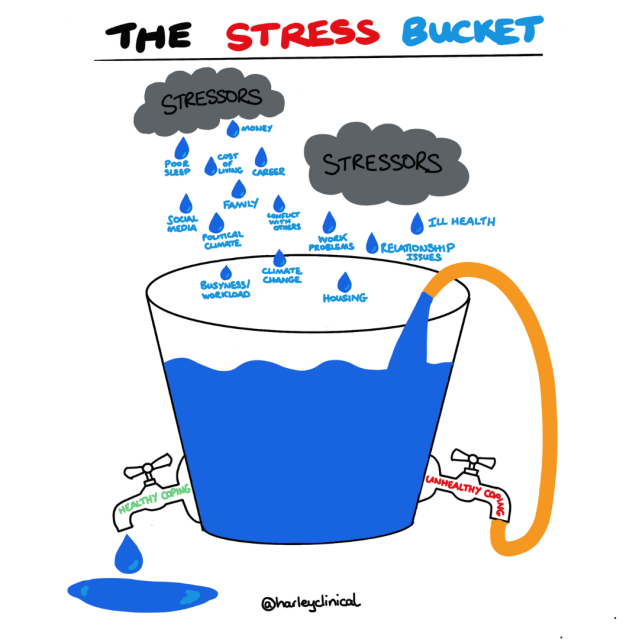Stress
How to Cope With Stress Using 'The Stress Bucket'
Simple tips to reduce stress fast.
Posted May 7, 2023 Reviewed by Jessica Schrader
Key points
- Chronic or severe stress can have far-reaching physical and mental health consequences.
- "The Stress Bucket" is a useful way to think about stress and how it impacts your life.
- This strategy can help you identify which coping strategies are helpful and unhelpful for reducing stress.

Stress is a common experience for most people, and various factors, such as work, relationships, or health issues, can cause it. Although a small amount of stress can motivate and energise us to accomplish our goals (for example, when we need to deliver a presentation or sit an exam), excessive or chronic stress can significantly impact our physical and mental health, so learning how to manage it is crucial.
In this post, we'll explore the warning signs and symptoms of stress and practical tips and strategies for coping with it effectively, using The Stress Bucket visual tool.
Identifying the warning signs of stress
Stress can affect us both physically and mentally. Understanding the physical and mental symptoms of stress is essential for recognising when we are experiencing stress and taking steps to manage it. Here are some common symptoms of stress to look out for:
Physical symptoms
- Headaches.
- Fatigue or low energy.
- Muscle tension or pain.
- Sweating.
- Nausea.
- Sleep disturbance.
- Digestive problems such as stomach ache, diarrhea, or constipation.
- Increased heart rate or blood pressure.
Mental symptoms
- Difficulty concentrating.
- Racing thoughts or constant worry.
- Feeling overwhelmed or anxious.
- Irritability or mood swings.
- Loss of interest in activities you previously enjoyed.
- Feeling sad or depressed.
It is important to note that everyone experiences stress differently, so your symptoms may not be the same as someone else's; however, if you are experiencing any of these symptoms, it's a good indication that you may be under stress and need to take steps to manage it.
What is causing me to feel stressed?

The Stress Bucket model is a useful tool to help manage stress (Brabban & Turkington, 2002). Imagine that you have a bucket that represents your capacity to handle stress.
Various stressors—the raindrops—fill up your bucket. The nature of these stressors is different for every person and unique to your life and circumstances. Some everyday stressors include work/workload, exams, difficulties in relationships, and money worries, particularly nowadays with the cost-of-living crisis. Some stressors might be sudden and unexpected such as the death of a loved one or being made redundant. If these stressors exceed your capacity to cope with them, your bucket overflows, resulting in the symptoms of stress.
How can I reduce stress?
The goal of reducing stress is to keep your bucket from overflowing by regularly emptying it, represented by the taps in the diagram. Healthy coping strategies will let the water out, but unhealthy strategies tend to act as hoses that inadvertently refill the bucket; they may feel like they help in the short term, but in the long term, they cause more problems and increase stress. Examples of unhealthy coping strategies include:
- Using alcohol or drugs to cope. Using drugs or alcohol to numb emotions or escape problems can lead to addiction and other health problems.
- Excessive screen use/doom-scrolling. It is a popular avoidance tactic or another way of numbing emotions.
- Over or undereating. Turning to food for comfort or avoiding food altogether can lead to poor physical health and body image issues.
- Avoidance. Avoiding situations or people that trigger stress can lead to social isolation and increased anxiety.
Healthy coping strategies for managing stress
The good news is there are many ways to cope with stress and reduce its impact on your life. Here are some examples of healthy coping strategies:
- Take care of your physical health. Regular exercise is a great way to manage stress (Tsatsoulis & Fountoulakis 2006).
- Zoom out and see the bigger picture. Often, when we feel stressed, our attention tends to narrow, and we can become consumed by the things that are stressing us. We can end up overthinking and worrying, further exacerbating stress. Take a step back or "unhook" from overthinking and worry by noticing and naming when worry appears.
- Practice mindfulness or mindful moments. Mindfulness-based interventions effectively reduce symptoms of stress, anxiety, and depression (Khoury et al., 2015).
- Slow down. Stress tends to speed us up—we rush from one thing to the next, trying to get as many things done in the shortest time. Take breaks through your day, even for a few minutes, and use that time to "check in" with yourself. Ask yourself in a compassionate tone, "How am I feeling right now?"
- Practice self-soothing at times of stress or when you feel overwhelmed.
- Get enough sleep. Lack of sleep can exacerbate stress levels (Hirotsu et al., 2015), so practice good sleep hygiene and aim for between seven and nine hours per night.
- Connect with others. Studies show good social support can enhance resilience to stress (Ozbay et al. 2007).
- Eat a healthy diet. A balanced diet can help support overall health and reduce symptoms of stress and anxiety.
- Make time for doing things you enjoy. Laughter and having fun are great stress relievers, so putting time and energy into something you enjoy doing is essential to get a handle on stress.
A version of this post was also posted on the Harley Clinical Psychology website.
References
Brabban, A. & Turkington, D. (2002) The Search for Meaning: detecting congruence between life events, underlying schema and psychotic symptoms. In A.P. Morrison (Ed) A Casebook of Cognitive Therapy for Psychosis (Chap 5, p59-75). New York: Brunner-Routledge
Hirotsu, C., Turkish, S., Levy Andersen, M. (2015). Interactions between sleep, stress, and metabolism: From physiological to pathological conditions. Sleep Science, 8(3), 143-152.
Khoury, B., Sharma, M., Rush, S.E. & Fournier, C. (2015). Mindfulness-based stress reaction for healthy individuals: A meta-analysis. Journal of Psychosomatic Research, 78 (6), 519-528.
Ozbay, F., Johnson, D.C., Dioulasso, E., Morgan Lii, C.A., Charley, D. & Southwick, S. (2007). Social support and resilience to stress: from neurobiology to clinical practice. Psychiatry (Edmonton), 4 (5), 35-40.


